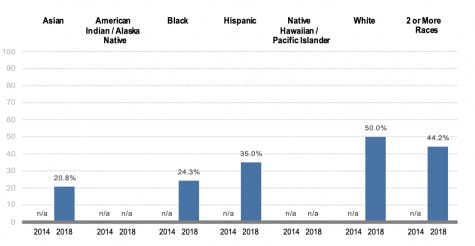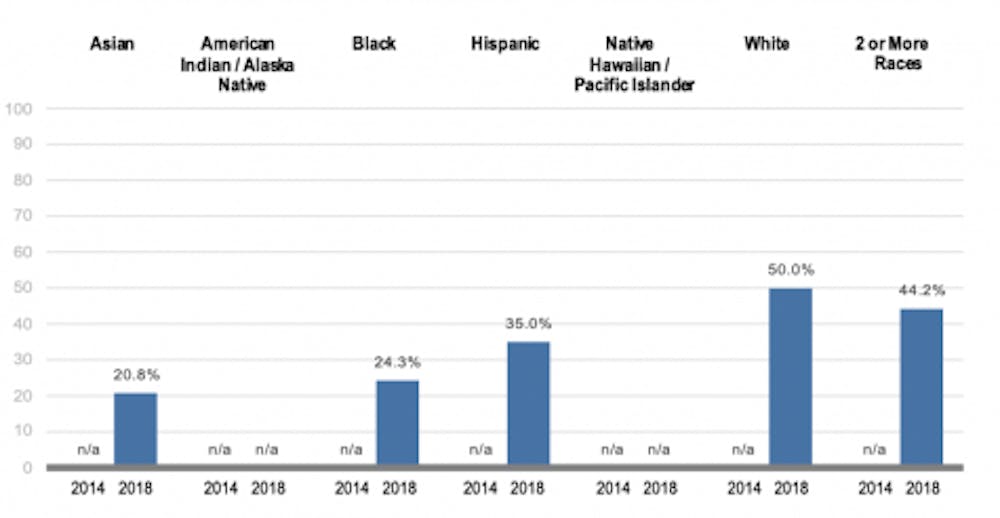With the 2020 presidential campaigns heating up over the course of this school year, many students and staff at Middlebury are already thinking about how to promote voting within the campus community.
As part of this effort, the NESCAC Votes summit convened at Middlebury’s Bread Loaf campus in Ripton during the last weekend of October. Designed in collaboration with the ALL IN Campus Democracy Challenge, a nationwide non-profit organization designed to help colleges and universities increase voter turnout, students and staff from eight of the 11 NESCAC schools gathered to develop strategies for the 2020 presidential election cycle.
As part of a tightly-packed two-day schedule, delegates from across New England participated in workshops, learned from peers at other institutions and reflected on ways to increase civic engagement on their own campuses.
The idea for the summit emerged during the summer of 2018 from collaborations between staff at Middlebury, Bowdoin, and the staff at the ALL IN Campus Democracy Challenge. This effort culminated in President Laurie Patton and Bowdoin President Clayton Rose issuing an invitation to other NESCAC presidents to participate in a conference-wide challenge, the goal of which is for each school to increase its student voting participation rate by 11 points to reach a 64% voting average in the 2020 presidential election.
President Laurie Patton stressed the importance of democratic participation in an academic environment in a statement to the Center for Community Engagement.
“Preparing students for engagement in the issues of our day is central to the educational mission of our institutions,” she said. “NESCAC Votes is a meaningful partnership that allows us to build on our collective institutional strengths and collaborate to deepen civic learning and engagement within our individual campuses.”
In one breakout session on college-specific data during the summit, participants examined reports generated by NSLVE (National Study of Learning, Voting, and Engagement), which is conducted by the Institute for Democracy & Higher Education at Tufts University. The reports broke down voting rates at each school by race, gender, academic major and other demographics.
The report for Middlebury’s 2014 and 2018 midterm elections shows that although 51% of eligible Middlebury students voted last year, a large ethnic and racial disparity exists in voter participation. According to the report, 50% of white students and 44.2% of students of two or more races voted, but participation dropped to 35.0% for Hispanic students, 24.3% for black students and 20.8% for Asian students.

A chart from the National Study of Learning, Voting, and Engagement study detailing voting rates at Middlebury by race.
Participants at the summit reflected on factors that contribute to this disparity. One participant suggested reaching out to on-campus affinity groups and college resources — such as PALANA House and the Anderson Freeman Resource Center — to better understand the barriers that marginalised students face.
Although Middlebury’s overall voting rate surpasses that of many peer institutions, the data is slightly misleading. Middlebury’s overall voting rate jumped from 15% in 2014 to 51% in 2018, which is greater than a national increase in student voting from 19.3% to 40.3% in the same period, but this percentage also includes graduate students at the Middlebury Institute of International Studies in Monterrey (MIIS). Because of the data collection method used, which intentionally prevents NSLVE from receiving personally-identifiable information about students, the study cannot analyse data from the college without including MIIS.
During the summit, participants also discussed ways in which faculty can better engage with politics in their classes and contribute to a safer campus climate for all students. One person said that professors should closely consider the language they use in political conversations. Instead of expressing complete neutrality, professors should prepare to facilitate a political discussion in case one arises during a class. Many students recalled experiences in which professors avoided engaging with politics in their classes, which students felt was unproductive because every subject has public and civic relevance.
Participants also discussed technical barriers to voting that students face, and ways to better address them. Students at NESCAC schools often reside out of state and wish to vote in their home states, which presents logistical challenges for volunteers at registration drives. Nearly one-third of Middlebury College voters voted absentee or by mail in 2018, and many students are also unsure how to navigate the absentee voting process.
Ashley Laux ’06, program director at the Center for Community Engagement, said that she plans to continue to support student leaders working to promote campus culture of voting and help students navigate various absentee ballot systems.
“MiddVote and the CCE will continue to lower technical barriers to voting by sharing information about voting laws and processes to students,” Laux said in an email to The Campus. “I hope that more central campus processes can include encouragement to register to vote or request absentee ballots.”
On day two of the summit, students divided into breakout groups for peer-led discussions and reflected on the goals, strategies and organizational structures central to their on-campus voter engagement efforts. Questions such as, “Do the members of your group mostly hold similar or different identities than you?” provoked discussion on the importance of including diverse identities in get-out-the-vote efforts. Students also highlighted weaknesses in their respective on-campus efforts and identified solutions to remedy them.
“My biggest take-away from the event is that we can all do our work better with a strong network,” Laux said. “I learned so much from students, staff, and administrators at Middlebury and the other NESCAC schools. I hope to continue to be in touch across NESCAC as we all work to strengthen our democratic engagement efforts in the lead-up to the 2020 election.”
Participants left the summit having developed an action plan for their schools. As one of its long-term goals, students at MiddVote hope to demystify the voting process and stress the importance of civic participation by developing resources for professors and students alike.

Emmanuel Tamrat '22 is Digital Director.
He began working for The Campus as a photographer and online editor in the fall of 2018, and previously served as senior online editor.
An Environmental Policy major, Tamrat hails from London, GB but calls Alexandria, VA home. At Middlebury, he is involved in Rethinking Economics and works as a Democracy Intiatives Intern with the CCE.




